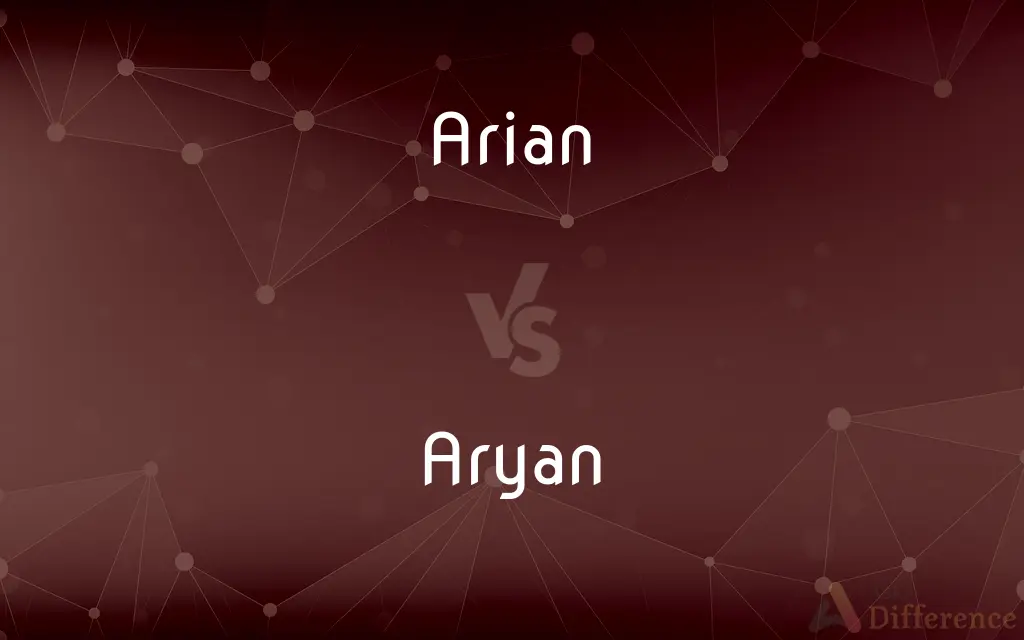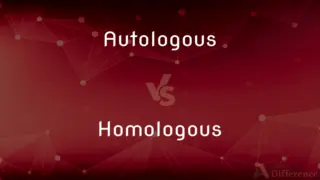Arian vs. Aryan — What's the Difference?
By Fiza Rafique & Maham Liaqat — Updated on April 27, 2024
"Arian" pertains to followers of Arius and his teachings in early Christianity, rejecting the Trinity concept; "Aryan" refers to an Indo-European ethnolinguistic group, historically misused in racial theories.

Difference Between Arian and Aryan
Table of Contents
ADVERTISEMENT
Key Differences
"Arian" refers to the theological position held by Arius, a 4th-century priest who contested the Trinity, specifically the divinity of Jesus, whereas "Aryan" originally described people speaking Indo-European languages, but has taken on various meanings over time.
The Arian controversy significantly influenced early Christian doctrine and led to the First Council of Nicaea, which condemned Arianism as heresy, while the term "Aryan" has been used to classify linguistic and sometimes racial characteristics of certain groups, notably in 19th and 20th-century racial theories.
"Arian" is primarily a historical and religious term, used to describe a specific Christian belief system and its followers, on the other hand, "Aryan" has been employed in anthropology, linguistics, and, infamously, in Nazi racial ideology.
The resurgence of interest in Arian beliefs has been mainly among scholars of religious and historical studies, whereas discussions around "Aryan" often arise in contexts involving discussions of racism, white supremacy, or historical linguistics.
Phonetically, "Arian" (pronounced "AIR-ee-an") aligns with its English origins, while "Aryan" (pronounced "AIR-ee-an" or "AR-ee-an") varies, showing its adaptation into different languages and contexts.
ADVERTISEMENT
Comparison Chart
Origin
Named after Arius, 4th-century
Indo-European ethnolinguistic group
Key Beliefs
Denial of the Trinity
No unified set of beliefs; varies by context
Historical Context
Early Christian controversies
Indo-European migrations, later racial theories
Usage
Theological, historical
Linguistic, racial, historical
Pronunciation
"AIR-ee-an"
"AIR-ee-an" or "AR-ee-an"
Compare with Definitions
Arian
Associated with anti-Trinitarian beliefs.
Arian doctrines were debated vigorously in the 4th century.
Aryan
Linguistic classification.
Aryan languages are spread across many countries.
Arian
A follower of Arius.
Arians were significant figures in early Christian history.
Aryan
Associated with Nazi racial ideology.
The term Aryan was misappropriated by Nazis to promote racial purity.
Arian
Pertaining to Arius's teachings.
The Arian controversy shaped early Christian debates.
Aryan
Pertaining to Indo-European peoples.
Sanskrit is considered an Aryan language.
Arian
Theologically significant term.
Understanding Arian perspectives helps in studying Christian doctrinal evolution.
Aryan
Controversially used in racial theories.
The misuse of Aryan has been criticized in modern discussions on race.
Arian
Historical Christian sect.
Arianism faced opposition from mainstream Christianity.
Aryan
Historical term in anthropology.
Aryan migration theories discuss the movement of these peoples into India.
Arian
See Aryan.
Aryan
Aryan or Arya (; Indo-Iranian *arya) is a term originally used as an ethnocultural self-designation by Indo-Iranians in ancient times, in contrast to the nearby outsiders known as 'non-Aryan' (*an-arya). In Ancient India, the term ā́rya was used by the Indo-Aryan speakers of the Vedic period as an endonym (self-designation) and in reference to a region known as Āryāvarta ('abode of the Aryas'), where the Indo-Aryan culture emerged.
Arian
Pertaining to Arius, a presbyter of the church of Alexandria, in the fourth century, or to the doctrines of Arius, who held Christ to be inferior to God the Father in nature and dignity, though the first and noblest of all created beings.
Aryan
Indo-Iranian.
Aryan
A member of the people who spoke the parent language of the Indo-European languages. No longer in technical use.
Aryan
A member of any people speaking an Indo-European language. No longer in technical use.
Aryan
In Nazism and neo-Nazism, a non-Jewish Caucasian, especially one of Nordic type, supposed to be part of a master race.
Aryan
One of a primitive people supposed to have lived in prehistoric times, in Central Asia, east of the Caspian Sea, and north of the Hindu Kush and Paropamisan Mountains, and to have been the stock from which sprang the Hindu, Persian, Greek, Latin, Celtic, Teutonic, Slavonic, and other races; one of that ethnological division of mankind called also Indo-European or Indo-Germanic.
Aryan
The language of the original Aryans.
Aryan
A non-Jewish caucasian of Nordic stock; - a classification used by Nazis, having no anthropological basis.
Aryan
Of or pertaining to the people called Aryans; Indo-European; Indo-Germanic; as, the Aryan stock, the Aryan languages.
Aryan
(according to Nazi doctrine) a Caucasian person of Nordic descent (and not a Jew)
Aryan
A member of the prehistoric people who spoke Proto-Indo European
Aryan
Of or relating to the former Indo-European people;
Indo-European migrations
Common Curiosities
Is "Arian" still a relevant term today?
It is mainly of historical and theological interest.
Can "Arian" refer to a race?
No, it strictly refers to followers of Arius's teachings.
Who uses the term "Aryan" today?
It's seen in historical, linguistic, and controversial racial contexts.
How are Arians and Aryans similar?
They share phonetic similarities but differ in meaning and context.
What does "Aryan" mean?
It refers to an Indo-European ethnolinguistic group and has other controversial meanings.
Was Arianism accepted in early Christianity?
It was initially popular but was eventually declared heretical.
How should one use "Arian" in a sentence?
"The early church faced many challenges, including the spread of Arian beliefs."
Why is "Aryan" controversial?
Due to its association with Nazi racial ideologies and white supremacy.
What did Arians believe?
Arians believed that Jesus Christ was not divine but created by God.
Is "Aryan" a scientific term?
It's used in linguistics and anthropology, but its racial implications are scientifically discredited.
How should one use "Aryan" in a sentence?
"The concept of an Aryan race has been debunked by modern genetics."
What is the impact of misunderstanding these terms?
Misunderstanding can lead to historical inaccuracies and potential misuse in racial or religious arguments.
How are Arians and Aryans different?
Arians relate to a Christian doctrinal stance; Aryans relate to ethnolinguistic and racial theories.
Is "Aryan" used in modern racial theories?
It is sometimes misused in extremist ideologies but is generally considered discredited in academic circles.
What led to the decline of Arianism?
The establishment of orthodox Christian doctrines and imperial support for them.
Share Your Discovery

Previous Comparison
Autologous vs. Homologous
Next Comparison
Volume vs. AmplitudeAuthor Spotlight
Written by
Fiza RafiqueFiza Rafique is a skilled content writer at AskDifference.com, where she meticulously refines and enhances written pieces. Drawing from her vast editorial expertise, Fiza ensures clarity, accuracy, and precision in every article. Passionate about language, she continually seeks to elevate the quality of content for readers worldwide.
Co-written by
Maham Liaqat












































